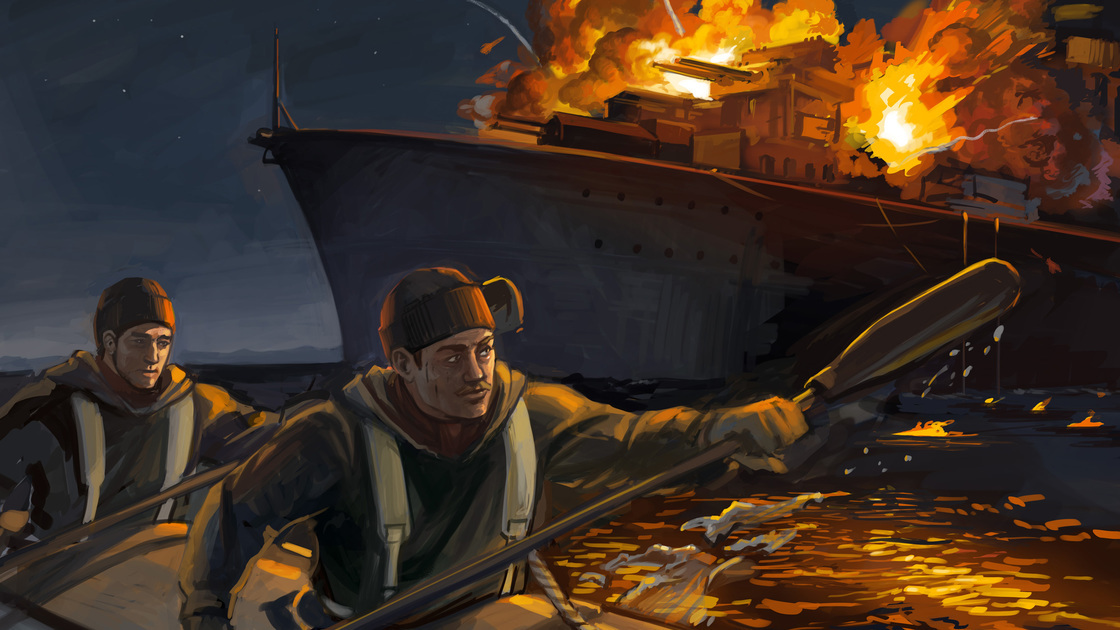It was early December 1942. For three years, a gruesome and unrelenting war had engulfed the Western world. With no end in sight, the Allies had to find a way to stop Adolf Hitler and his Nazi regime.
Bordeaux, France was a major concern of the Allies. The Germans used this port to bring in vital supplies without using the English Channel.
It also served as an important military base. Boats had to travel 60 miles up the heavily guarded Gironde estuary to reach the port, making it a strategic German fortification. How would the Allies break through this impenetrable fortress?
The 60-mile inland port was heavily secured, which made a large-scale naval attack impossible. A bombing raid could have obliterated the port, but that would have killed many French civilians. This was not an option.
Maj. Herbert “Blondie” Hasler came up with a brilliant but daring plan. There was a chance that a small team of commandos in camouflaged, collapsible canoes could get past German security and conduct a surprise attack.
Twelve men—the toughest of the lot—were selected for the challenge, code-named Operation Frankton. Led by Hasler, the team became known as the Cockleshell Heroes, called after their special canoes, nicknamed “cockles.”
On Dec. 7, 1942, an Allied submarine unloaded the six “cockles” and 12 commandos about 10 miles away from the mouth of the Gironde estuary. On the way out of the hatch, however, one of the canoes was damaged, which left only five canoes. Two of the men had to stay behind.
As the 10 remaining men reached the mouth of the estuary, the harsh riptide caused another canoe to swamp. Soon after, a second canoe capsized, and its commandos tried to swim to shore, but never made it. The remaining six commandos moved past German security and headed up the river, covering nearly 20 miles before sunrise.
During the journey, the Germans discovered one of the canoes and arrested its occupants. This left just two canoes—manned by Hasler, Bill Sparks, William Mills and Albert Laver—to finish the job. The Germans stepped up security along the river, making it even harder for the four remaining commandos to avoid capture. Remarkably, they covered 37 miles over the next two days. Reaching Bordeaux on December 11, they prepared to attack late that evening.
At 9 p.m., the four commandos snuck into the harbor, unnoticed by the enemy. They quietly made their way around the docks, carefully placing explosive limpet mines on several merchant ships. One pair nearly got caught by a German sentry, but the men managed to hide in the shadows from the search light.
After rigging the explosives, the men quietly crept to their camouflaged canoes and paddled out of the harbor. They were miles away when the ships blew up a few hours later.
The four men paddled down the river, sunk their canoes, and made their way north on foot, splitting up to make it more difficult for the Germans to catch them. Hasler and Sparks managed to reach the French town of Ruffec where the French Resistance kept them hidden.
Eighteen days later, they traveled to Gibraltar, Spain, en route to England. Of the 10 men who began the expedition, only Hasler and Sparks survived. By the end of the mission, six, including Mills and Laver, had been caught by the Germans and shot. Two died of hypothermia.
Though only two men survived to tell the story, the memory of the “Cockleshell Heroes” lives on. The tremendous bravery and perseverance that these British men showed during Operation Frankton is remarkable. They knew that their mission would be mentally and physically strenuous, but they were still willing and even excited to do their part to help end the war with Germany! The two men who couldn’t participate because of their punctured canoe were so devastated that they started crying. Though it probably saved their lives, they couldn’t bear to see the other men go on without them.
As young Christians, we can learn a lot from these 10 commandos who risked their lives and persevered to accomplish a seemingly impossible feat. It’s easy to minimize the importance of our role in God’s Work. Surely a teenager couldn’t be that important. But 1 Corinthians 12 shows us that God has placed each of us in the body for a specific purpose. We have to be excited about our job of reaching the largest audience possible and supporting this great Work of God even though there will be challenges along the way.
But just having excitement about our job isn’t enough. It takes courage and perseverance to finish the race. We don’t want to be the ones who drop out of the race. It would have been easy for one of those commandos to think: This is just too hard, and it probably won’t work anyway. But they all kept pushing their limits until they succeeded or died trying! Do we have this same excitement and perseverance to finish this Work?
Winston Churchill said that the attack of Bordeaux probably shortened the war by six months. The bravery and perseverance of these 10 commandos probably saved thousands of lives in the long run. Likewise, our actions today could either hasten the return of Jesus Christ or hold it back. We can’t afford to be lukewarm about our mission. God wants us to be on fire spiritually!
As young people, we need to think about what we can offer the Work. We can help the Work by praying fervently, paying tithes, and serving in our local congregations. We may be able to support God’s Work by attending Herbert W. Armstrong College.
The Cockleshell Heroes displayed a tremendous amount of courage and perseverance in their attack against Bordeaux. By following their example, we can do our part to help support and finish this great Work of God.
